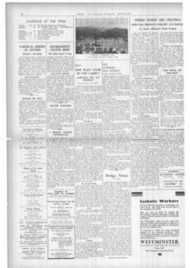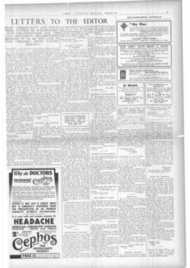Page 5, 26th June 1936
Page 5

Report an error
Noticed an error on this page?If you've noticed an error in this article please click here to report it.
Tags
Share
Related articles
The Olympic Games
Temporary Peace For A Divided World
Latin At Olympics
Gear Up For 27 Days Of Royal Weddings
Gaelic Games Are Often Political
OLYMPIC GAMES IN GERMANY : Athletics Through The Ages
With the cream of the world's athletic talent soon to meet in rivalry at Berlin, a glance at the history of games may prove instructive.
The oldest known organised games took place in Ireland. The Tailtean Games were founded about 3,000 B.C. by Luguid the Strong Arm in memory of the beautiful Queen Tailte.
The earliest recorded Greek games were those at the funeral of Patroclus, in 1100 B.C. It is believed, however, that still earlier athletic meetings had been held at Olympia on the plain of Elis. These were said to have been founded by Hercules (surely the world's greatest athlete! ) and they were revived in 884 B.C. by lphitus at the command of the Delphic Oracle. The original Olympic Games took place every four years and were confined to male competitors of the highest class under thirty-five years of age. Women were permitted to own chariots, but they were not allowed to attend the games as spectators. The penalty for doing so was death The Greek games were purely amateur, the victor's sole reward being a crown of wild olive leaves. This was in direct contrast to the Roman public games, wherein nearly all the competitors were professionals.
In England the fashion in games has frequently changed. During the Middle Ages they had a distinctly military flavour. Jousts and tournaments, archery and sword exercises were the popular recreations.
Under King John, however, wrestling became the national pastime, while in the reign of Edward III weight-putting became so popular that, along with football, it was banned by statute, so seriously did it affect archery. Under Henry VIII athletics came greatly to the fore and the monarch of many wives was acclaimed world's champion hammer-thrower by his admiring subjects.
Trade Guilds and Sport
The old trade guilds did much to foster sport. At Chester for many years, for instance, there was an annual Shrove Tuesday football match, said to have originated with the head of a Danish invader as ball, between the drapers and the shoemakers.
All the Stuart kings were ardent supporters of athletics, and James I wrote a treatise on the subject for his son, "Baby Charles."
The first inter-university sports were held at Oxford in 1864. It was thirty years later that a French enthusiast, Baron Pierre de Combertin, succeeded in reviving the Olympic Games. The first of these international contests took place, appropriately enough, at Athens in 1894, before a crowd of 45,000 spectators. So far the greatest measure of success in them has been attained by the British Empire. But Uncle Sam threatens to overhaul us.
blog comments powered by Disqus













